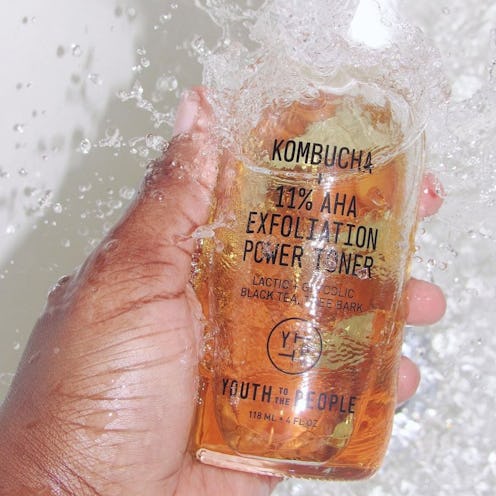(Skin)
There's A Reason Why You're Now Seeing Kombucha In Skin Care Products
The trend just got, er, trendier.

When it comes to kombucha, you probably fall into one of two categories: you can't make a grocery store run without throwing Health-Ade's Pink Lady Apple in your basket, or, as much as you try, you can't get seem to get used to the very specific taste. There's not much in-between. But regardless of your opinion on the flavor, if you're a beauty fanatic, you might have recently heard about brands using kombucha in skin care. Yes, the buzzy drink is now found everywhere from the aisles of Whole Foods to Sephora.
But before you slather it all over your face, you'll probably want to know exactly what kombucha is all about. "Kombucha is a fermented fizzy tea that combines yeast and bacteria," Dr. Marina Peredo, a board-certified dermatologist in New York, tells TZR. The dermatologist says the bacteria and acids in kombucha form SCOPY, which stands for symbiotic colony of bacteria and yeast. "It is the film that lays on the top of kombucha," she explains. "The fermentation process amplifies the naturally occurring concentration of probiotics, vitamin C, B vitamins, and antioxidants which protect cells from damage."
Dr. Peredo says the common probiotic strain in kombucha is lactobacillus, which can help to calm skin irritations. "Probiotics in skin care work with the skin to promote good bacteria and keep the microbiome in a balanced state," the dermatologist adds. "This repairs and strengthens the skin barrier to aid in better natural protection from environmental stressors."
Additionally, Dr. Amanda Champlain, MD, a board-certified dermatologist in Texas, says there are about 1,000 species of bacteria living on your skin forming the skin microbiome. "Topical probiotics [like kombucha] may support a healthy skin microbiome which serves several important functions, including preventing infections, maintaining an acidic skin pH and moisturization of the skin, and controlling inflammation in the skin," she tells TZR.
"Patient’s with inflammatory skin problems, such as acne, rosacea, and eczema may see improvement in these conditions with the use of kombucha, or probiotic-containing products in addition to their prescription medical treatments," Dr. Champlain explains. However, the dermatologist says really anyone could benefit and potentially improve the health of their skin with these products.
If you're curious to learn more about kombucha in skin care, ahead, find what skin types it works best on, all well as all the benefits.
Kombucha In Skin Care: The Benefits
"Kombucha is packed with antioxidants that fight free radicals and reduce the signs of premature aging," Dr. Peredo says. Plus, kombucha also includes lactic acid bacteria, which Dr. Peredo says can lightly exfoliate the skin to brighten and even skin tone, as well as reduce fine lines and dark spots. On top of that, the dermatologist says kombucha contains antiseptic qualities and natural acids which can balance the skin’s pH levels for a clearer complexion. "There are also B vitamins which help provide a healthy glow," Dr. Peredo adds.
Dr. Champlain says kombucha isn't light-sensitive, therefore it can be incorporated into either your morning or nighttime skin care routine. And, it's important to note that patience is key when using products with kombucha. "Typically it is at least one month before you’ll start to see results," Dr. Peredo says. "This is when the skin's cells start to turn over."
Kombucha In Skin Care: The Products It's In
Dr. Peredo says kombucha can sometimes be added to vitamin D products to further protect the skin. "Glycolic acid can also help to unclog and reduce pore size," she adds. Though it's still relatively new to the skin care space, kombucha is found in everything from toners to cleansers. Dr. Peredo says most skin care products will list kombucha as an ingredient. "If not, kombucha can be listed as saccharomyces ferment filtrate, kombucha black tea ferment, and saccharomyces xylinum (kombucha) black tea ferment," she explains. "Saccharomyces is a fungi which includes different species of yeasts that can be found in kombucha." That being said, try these formulas for yourself by shopping seven products with kombucha below.
We only include products that have been independently selected by TZR's editorial team. However, we may receive a portion of sales if you purchase a product through a link in this article.
This article was originally published on